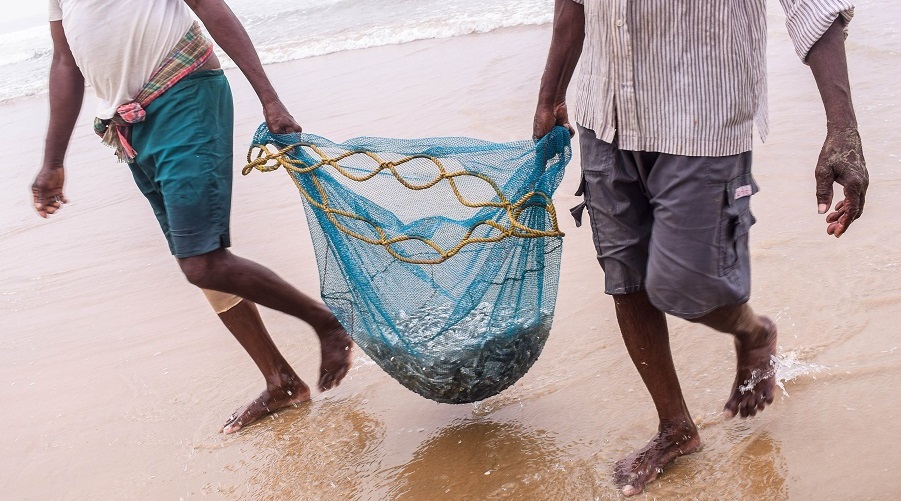
Fishermen in Digha, India. Photo by Krishnendu Biswas, Pexels.
A few big players in the Indian Ocean Rim are disproportionately accessing the region’s fisheries resources through harmful subsidies while limiting the access to those resources of small-scale fleets from nutrient-insecure countries.
In a new paper published in Ocean Sustainability, researchers with the Sea Around Us – Indian Ocean initiative at the University of Western Australia and the Institute for the Oceans and Fisheries at the University of British Columbia, assessed the provision and spatial distribution of fisheries subsidies in the Indian Ocean and found that 60 per cent are harmful subsidies granted to large-scale industrial fishing fleets by a few subsidizing countries.
Harmful subsidies are direct or indirect financial transfers from public entities to fishing companies. They include fuel subsidies, non-fuel tax exemptions, access deals that allow one country to fish in the waters of another, boat construction, renewal and modernization support, and the provision of market and storage infrastructure, among others.
Such harmful subsidies enable fishing capacity to increase to a point where the exploitation of fish stocks exceeds the highest catch they can support long-term, effectively resulting in overfishing. In essence, these subsidies allow fleets to keep fishing when it otherwise would not be financially profitable to do so.
“Total fisheries subsidies in the Indian Ocean were estimated at $3.2 billion in 2018, and our results show that, of those, almost $2 billion were harmful subsidies, most of them provided by Indian Ocean Rim countries, with only 8 per cent provided by distant-water fleets,” said Vania Andreoli, lead author of the paper and PhD candidate with the Sea Around Us – Indian Ocean. “Australia, Pakistan, Thailand, India, Malaysia and Indonesia were the major subsidizers, with the four latter providing almost 45 per cent of all harmful subsidies in the region.”
Besides harmful, there are also ambiguous and beneficial fisheries subsidies. The former can lead to either sustainable management or overexploitation, depending on how and to whom these programs are delivered, while beneficial subsidies can promote fisheries resource conservation, management and sustainability.
“In total, small-scale fisheries received 30 per cent of all subsidies and industrial fisheries 70 per cent. Of these industrial subsidies, over 60 per cent were harmful. In the case of small-scale fisheries, a bit over half of the subsidies were harmful,” Andreoli said. “Harmful subsidies artificially enhance the economic viability of industrial fleets relative to vessels in the small-scale sector, which in the Indian Ocean supports millions of jobs and plays a vital role for local nutritional security in already disadvantaged countries.”
Distant-water fishing subsidies
Along with the large subsidies received by the local industrial sector, distant-water fishing fleets operating in the Indian Ocean received $260 million in subsidies, 73 per cent of which were harmful. Highly developed East Asian countries, mainly Taiwan, South Korea, China and Japan accounted for more than half of total distant-water fishing subsidies in the Indian Ocean, while the rest came from European countries, mostly Spain and France.
“These foreign fleets target mostly the Exclusive Economic Zones (EEZ) of Somalia, Iran, Indonesia, Myanmar and India, as well as the High Seas,” said Dr. Dirk Zeller, senior author of the study and director of the Sea Around Us – Indian Ocean. “Harmful subsidization encourages the resource-grabbing behaviour of distant-water fleets, which has serious consequences for overfishing and resource depletion.”
In addition to scrutinizing the spatially-distributed fisheries catch data provided by the Sea Around Us initiative, the researchers examined the subsidies database generated by UBC’s Fisheries Economics Research Unit and matched these data with fisheries subsidies predictors such as the size of the EEZ and seafood export quantities. They found that large amounts of seafood exports correlate with high levels of harmful subsidies given by Indian Ocean Rim countries to their industrial fishing fleets.
“In other words, industry profit is prioritized over food and nutritional security of people in a region that is home to one-third of the world’s population. It becomes a game of survival of the richest, not the fittest” Zeller said. “This is highly problematic in light of the universal endeavour to End Hunger, a globally agreed UN Sustainable Development Goal. These harmful subsidies support and exacerbate overfishing and, therefore, diminish the availability of seafood and associated critical nutrients for the regional populations that depend on them for their food and nutritional security.”
The role of the small-scale sector
For the researchers, these results highlight the urgency of reducing or eliminating harmful subsidies to large-scale fisheries operating in the Indian Ocean. They also point to the need to restructure small-scale sector subsidization towards beneficial subsidies that could take the form of increased co-management and local community support, as well as active support for spatial management and habitat restoration.
“Subsidies should be redirected towards the implementation and management of no-take Marine Protected Areas, which have been shown to provide numerous co-benefits beyond biodiversity conservation. They also increase food and nutrient security for local populations due to fish biomass spillover into adjacent areas open to local small-scale fisheries,” concluded Dr. Jessica Meeuwig, co-author of the paper and director of the Marine Futures Lab at UWA.
The paper “Fisheries subsidies exacerbate inequities in accessing seafood nutrients in the Indian Ocean” was published in Ocean Sustainability, https://doi.org/10.1038/s44183-023-00031-9

